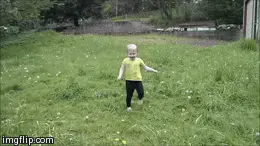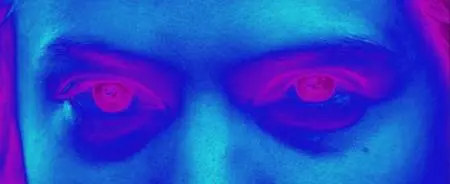It's that time of the month again, and like a menstruating uterus this editor bleeds red ink all over some prose...yeah...
First up, Only2be gives us a paragraph on parenting:
In its purest form, parenting is the humbling endeavor to live up to our own devotion. Modern parenting, on the other hand, is the absurd application of our massive neocortex to go beyond nature’s instincts and improve on the original design. In a way, we have to – we have no choice. We can’t very well send the three year olds out into the field to watch the chickens. We are so densely settled that we need to keep them with us, watch over them or pay someone to do it for us. We strap them down tight into car seats, and ask them not to touch things in grocery stores. We are obligated to teach them things like how to share, say please, get dressed (in clothes that are weather-appropriate, no less) and eat what they should even though they know the popsicles are in the freezer. This is obviously more than nature intended.
There are two things in this paragraph that might be worth addressing. The first is the phrase “we can’t very well send the three year olds out into the field to watch the chickens” which might be a little unclear. I’m not sure if I should read it as: “In the past, we could just send our three year olds out into the field to watch the chickens, but now, due to how things have evolved, we have to be afraid of strangers, wandering into the road, etc.” or if you meant it as a present thing—we can’t, literally, send our three year olds to do this because that task is inherently problematic.
If it was the former, then a simple rephrasing could work: “We can no longer send the three year olds out into the field to watch the chickens.” I like the idea of making a comparison to something in the past—earlier in human history instinct was all we needed, but due to the advancement of modern civilization our instinct can’t be trusted and we need critical thinking skills. If it was the latter, then perhaps allude to something that more directly pertains to the modern world: “We can’t very well send our three-year-olds across the street to fetch the mail.” I’ve put both options in the revision, so you can pick what you like best (or go with something else entirely).
The second issue with this piece was a little wordiness in the second half. I just deleted words that were serving no additional purpose to streamline the prose.

Revision:
In its purest form, parenting is the humbling endeavor to live up to our own devotion. Modern parenting, on the other hand, makes use of our massive neocortex to go beyond nature’s instincts and improve on the original design. We have no choice. We can’t very well send the three year olds across the street to get the mail/We can no longer send the three year olds out into the field to watch the chickens. We are so densely settled that we need to keep them with us, watch over them or pay someone to do it for us. We strap them down into car seats and ask them not to touch things in grocery stores. We teach them to share, say please, get dressed (in clothes that are weather-appropriate, no less) and eat what they should even though they know the popsicles are in the freezer. This is obviously more than nature intended.
I wanted to add that the line “eat what they should even though they know the popsicles are in the freezer” is an excellent example of how to show instead of tell.
CSolunar24 has the following paragraph:
Amethyst eyes snapped open, adjusting to the light streaming in through the window. A draft ruffled the gauzy curtains alerting Luz that she had left the window open the night before. The scent of wildflowers carried on the crisp breeze assured her that she was in her own bed. ‘Well I can’t be blamed for wanting to be sure’, she supposed.
She had that dream again. She could just grasp the tendrils of it drifting away through sieve of consciousness. There’s nothing to remember really, it had always been the same. An unnaturally hot, and bright light. That’s all she could ever remember. Yet that was not the part that had her waking in cold sweats as a child. No, it was the odd sense of foreboding the dreams always seemed to bring. Of finality. Of fear. Now she had learned to adapt to the unpleasant lingering so that all that remained was the slight feel of disorientation. Almost a jetlag, as if, she had just traveled a very far distance in a sort amount of time.
CSolunar24 says: I’m trying to start a story and the dream will play a bigger role in the unfolding of the backstory . It’s a sci-fi fantasy thing. Really I just need to know how it sounds outside my head! I know what I want to convey but have no idea how it reads. Please help! Thanks!!
This sounds like the start of an interesting story! But let's get to work: One of the issues I see with this piece is that some of the descriptive choices feel overly wrought or disproportionately emphasized. This is my round-about way of saying the prose is a little purple (google “purple prose” if you’re unfamiliar with the term).
Let’s start with the amethyst eyes snapping open: You said this is sci-fi/fantasy, so maybe her eyes really are purple, but describing eyes as gemstones is a little cliché (sapphire eyes, emerald eyes...) and when you’re narrating from limited third person, it’s odd to get a description of the protag from the outside. Perhaps the eye color can be revealed later in a mirror (which is also cliché, but can be pulled off if you do it right) or by some other character mentioning it. Also, “snapping” is generally a closing action unless you’re suggesting a snapping sound was made when her eyes opened.
The protagonist is alerted by a draft ruffling gauzy curtains. “Alerting” generally means you’re being warned of danger, whereas this is more of a reminder than a warning. You also have a non-sentient thing (the draft) performing sentient action(alerting)—and this happens in several places. The eyes snap, the scent assures. While this can be an effective tactic, it works best if these non-sentient things are what’s important about the passage. But the dream is what’s most important. If the dream was alerting her, this would feel more apt.
The “well I can’t be blamed” line borders on corny. You don’t need it at all if you simply show her getting her bearings instead—and you have some of that in there already.
Tendrils drifting through a sieve of consciousness is also a bit purple.
The remainder of my revision just involved some rewording for efficiency and impact. Now, you will see a lot of the flowery language is lost and this might be something you want to put back in to add some more flavor. But if you do, I would suggest being judicious about it. Ask yourself if your word choice is accurate to what you’re trying to depict, or simply dramatic. And ask yourself if concrete actions and objects will make the story come alive more. Sometimes the more purple descriptions miss the mark because they’re bringing to mind things that are abstract or only loosely relevant, and hence they keep the reader from experiencing what’s actually going on.

Revision:
Luz’s eyes shot open, adjusting to the light streaming in through the window. She had that dream again, but it slipped away as she watched the curtains ruffle and float in a draft. She had left the window open the night before, and now the familiar scent of wildflowers reduced the dream to nothing more than an unpleasant lingering.
Not that there was anything to remember, really. It had always been the same—an unnaturally hot and bright light. That was it. But the part that had her waking in cold sweats as a child was the sense of foreboding that came with it—of finality, of fear. But these days it didn’t register as more than a mild disorientation. Almost a jetlag, as if she had just traveled a very far distance in a short amount of time.
That concludes this edition! Feel free to discuss these edits and make other suggestions in the comments.
And if you have a paragraph or short passage in need of editing, post up to 300 words of prose in the comments below, together with a brief description of the editing goal and any relevant contextual information, and you may be chosen to have your paragraph edited next time!

About the author
Gayle Towell’s stories have won the 2013 Women’s National Book Association writing contest, the 2014 Willamette Writers Kay Snow fiction award, and have been published in Menacing Hedge, Pif Magazine, and the Burnt Tongues anthology among other places. Her novella Blood Gravity was released through Blue Skirt Productions in September 2014. Gayle is the founding editor of Microfiction Monday Magazine and cofounder of Blue Skirt Productions, an artists’ collective. For more information, visit gayletowell.com.








